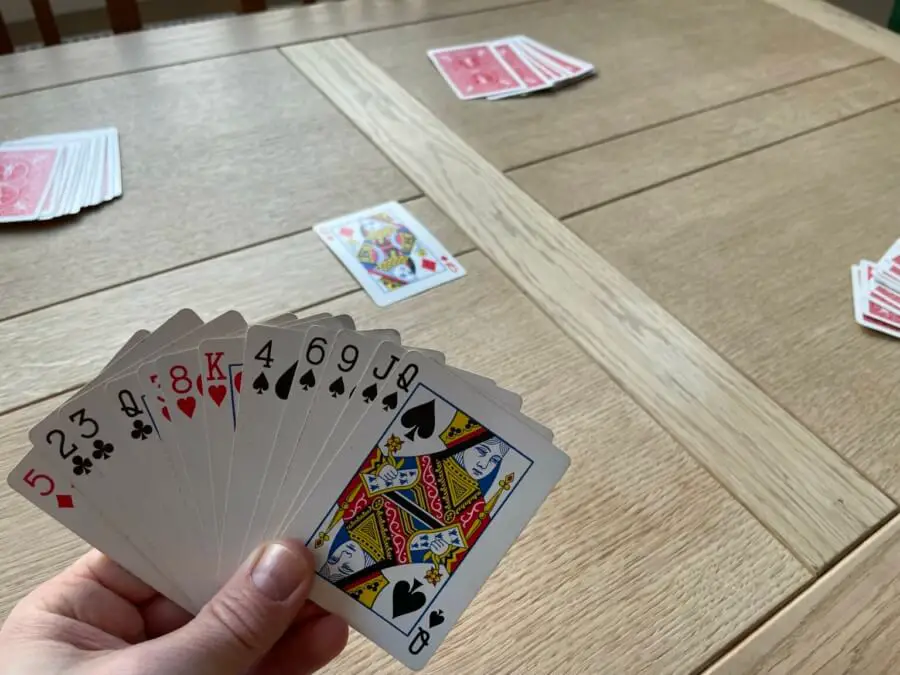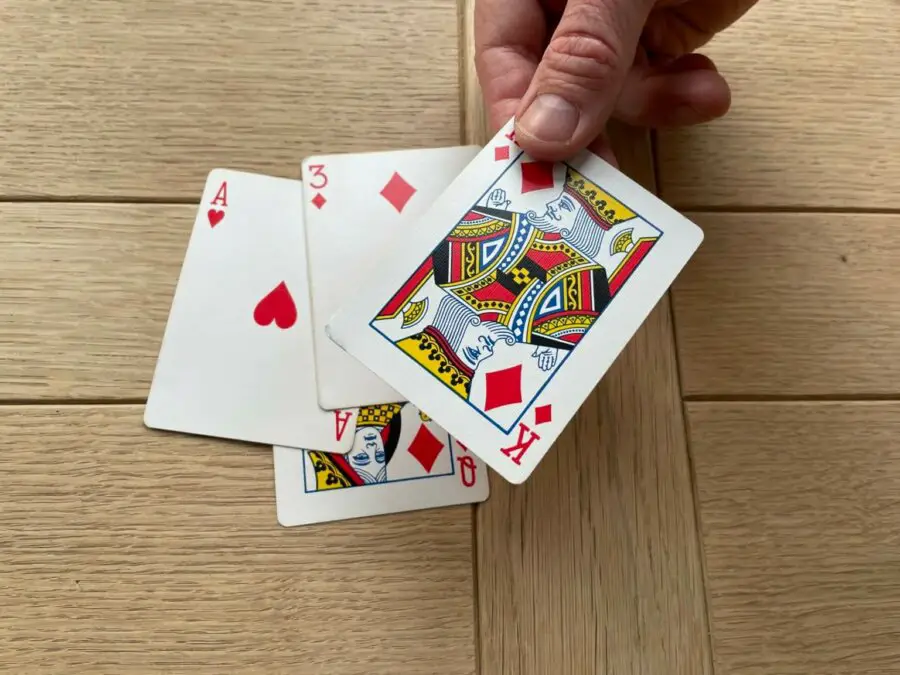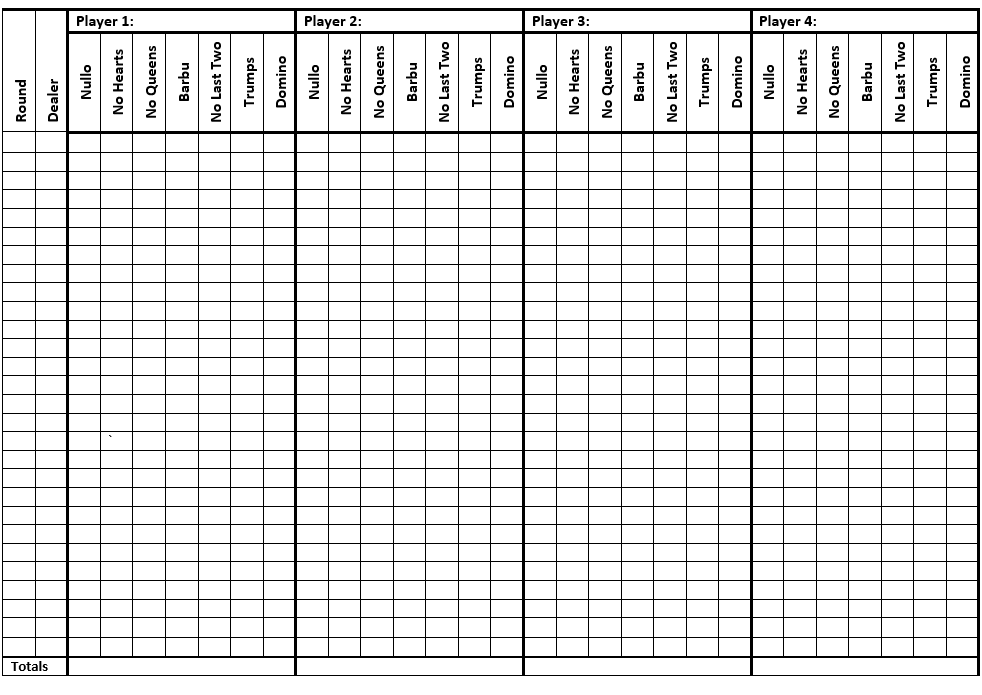Barbu, a card game steeped in European tradition, stands out as a beacon of strategy and intrigue in the world of card games.
This guide dives into the heart of Barbu and will explain the rules and strategies of this fun trick-taking game.
Table of Contents
What is Barbu?
Barbu, often played in social settings, is a trick-taking card game for 4 players.
It uses a standard 52-card deck and revolves around completing contracts (more about these shortly), each with its own set of rules and objectives.
Each player takes their turn as dealer, and chooses which order to play the 7 contracts in, based on their hand, and which contract plays to their hand’s strength.
The contracts include challenges such as ‘No Tricks’, ‘No Hearts’, and ‘No Queens’, each requiring a unique strategy.
With 4 players and 7 contracts per player, the game lasts for a total of 28 rounds, and can take up to 1 hour to play.
This blend of multiple games in one makes Barbu not just a test of card-playing skill but also of adaptability and strategic planning.
How to Play Barbu
- The initial declarer is chosen at random. The player to the right of the declarer acts as the card dealer
- Each round starts with the dealer dealing out all 52 cards, giving each player a 13-card hand.
- In each round, the declarer chooses 1 of the 7 contracts to be played (more about these later)
- The other players, in turn, have the option to ‘double’ the contract, increasing the stakes for that hand.
- The declarer always goes first and must play the first card. Whatever suit they play is declared the lead (trump) suit.
- Play continues clockwise, and each player must follow suit if they can; if they cannot, they may play any card. The highest card of the suit led wins the trick unless a specific contract rule overrides this.
- Scoring in Barbu varies based on the contract, but it generally involves gaining or losing points for each trick or specific card taken. For example, in the ‘No Hearts’ contract, players typically lose points for each heart card taken. The exact points will be explained in later sections.
- The above sequence continues for a total of 7 rounds, with the declarer having to choose a new contract each round. A contract can only be chosen once, meaning all 7 contracts should have been played by the end of the first 7 rounds.
- After a series of 7 rounds have been played, the role of the declarer moves to the left, and the previous declarer now acts as the dealer.
- The game of Barbu ends after a total of 28 rounds, once each of the 4 player’s has acted as declarer, and played all of the 7 contracts.
- Scores are totalled and the player with the highest score is declared the winner.


The 7 Contracts of Barbu
Each round in Barbu is defined by a specific contract, with 7 contracts to choose from in total:
- No Tricks (or “Nullo”): In this contract, the aim is to avoid winning any tricks.
- Scoring: Each trick won during this contract scores the player a -2 point penalty.
- No Hearts: Similar to Hearts, players must avoid winning any tricks containing Hearts.
- Scoring: The player who captured the Ace of Hearts scores a -6 point penalty. All other cards of the Hearts suit scores a -2 point penalty.
- No Queens: The focus here is to avoid capturing any Queens.
- Scoring: Each Queen captured scores the player a -6 point penalty.
- No King of Hearts (or “Barbu”): Winning the trick with the King of Hearts results in a significant point penalty.
- Scoring: The player who captured the King of Hearts scores a -20 point penalty.
- Trumps: A more traditional contract, where a suit is chosen as the trump. The goal is to win as many tricks as possible.
- Scoring: Players are awarded +5 points for every trick won during the round.
- No Last Two: Similar to the “No Tricks” contract, however only the final two tricks of the round count.
- Scoring: The player who wins the last trick of the round scores a -20 point penalty. The player who wins the second to last trick scores a -10 penalty.
- Domino: A special contract where the aim is to get rid of your hand as quickly as possible.
- The Declarer choose the rank, such as 8 and will say “Dominoes from the 8”.
- Players, beginning with the declarer, must play a card of the chosen rank or a card that builds on the sequence of the already played suit. E.g. 8 Hearts could be followed by 7 Hearts, 9 Hearts or another 8.
- Play continues, e.g. if a player played 9 Hearts, the next player could then play 10 Hearts or another 9 (8 Hearts is valid, but this card has already been played in this example!).
- Aces are high, and 2’s are low.
- If a player cannot play a valid card, they pass.
- Play continues until all cards have been played.
- Scoring: Points awarded depends on the order players managed to get rid of all cards in their hand. First to get rid of their cards is awarded +45 points, the next player is awarded +20 points, then +5 points, and the last player is given a penalty of -5 points.
Doubling in Barbu
Doubling in Barbu is a crucial element that adds a strategic layer to the game.
After the declarer has chosen the contract for the round, players have the opportunity to double. This means they’re making a side bet against one or more players, speculating that they’ll perform better in the round.
A player can double any, some, or none of the other players, but the declarer can only double those who have doubled them.
Each player must double the declarer at least twice in each series of seven hands.
The outcome of these doubles significantly affects the scoring, as they modify the points gained or lost based on the performance relative to the doubled player(s).
Scoring in Barbu
In Barbu, the goal is typically to achieve the highest positive score, or the least negative score, depending on the contract.
Each of the seven contracts has a different scoring method. The contracts can be broadly divided into positive and negative contracts. In positive contracts, players aim to score points, while in negative contracts, they try to avoid penalties.
- Standard Scoring:
- For each contract, players earn or lose points based on their performance. For example, in the ‘No Hearts’ contract, players might lose points for each heart card they take. The exact points lost or gained depend on the specific contract and the version of Barbu being played.
- In some variants, the scores for different contracts could be, for example, -2 points for each trick taken in ‘No Tricks’, or -6 points for capturing the King of Hearts in ‘Barbu’.
- Doubling and Redoubling:
- If a player doubles another and performs better in that hand, the difference in their scores is added to the score of the better-performing player and subtracted from the other player’s score. This difference is doubled if there was a redouble.
- For example, if Player A and Player B double each other, and Player A scores 10 points while Player B scores 5, Player A would gain an additional 5 points (or 10 in case of a redouble), and Player B would lose the same amount.
- Scoring Calculation:
- Scores are calculated hand by hand, and the effects of doubles and redoubles are accounted for after each hand.
- The scoring system aims to achieve a net zero sum by the end of the game, balancing points gained and lost across all players.
- The highest positive score after 28 rounds wins the game of Barbu.
Understanding these scoring principles is crucial for strategizing in Barbu, as players need to balance the risks and rewards of different contracts and the use of doubles.
Tip: Print the scoresheet below from www.catsatcards.com for an easy way of keeping score alongside the 7 contracts.

Example Gameplay of Barbu
To better illustrate how Barbu is played, let’s consider three example rounds with our players Alice, Bob, Carol, and Dave.
Round 1: No Tricks Contract (“Nullo”)
- Setup: Alice is the declarer and elects the ‘No Tricks’ contract, aiming to avoid winning any tricks.
- Play: Bob leads with 2 of Spades. Carol and Dave follow suit, with Carol playing 3 of Spades and Dave playing 10 of Spades. Alice, with no spades, plays 8 of Hearts.
- Result: Dave, having played the highest Spade, wins the trick, and will score -2 points for the trick. This is beneficial for Alice, as in this contract, winning tricks results in penalty points.
Round 2: Trumps Contract
- Setup: Bob is the declarer and chooses the ‘Trumps’ contract with Diamonds as trump.
- Play: Bob leads with King of Diamonds. Carol can follow suit and plays 3 of Diamonds. Dave and Alice don’t have any Diamonds in their hands, and play a 4 of Clubs, and 9 of Hearts, respectively.
- Result: Bob effectively uses the trump suit to win the trick, and is awarded +5 points for the trick. The goal in this contract is to win as many tricks as possible.
Round 3: No Queens Contract
- Setup: Carol is declarer, and opts for the ‘No Queens’ contract.
- Play: Carol leads with 8 of Hearts. Dave follows suit, playing 10 of Hearts, as does Alice, playing 6 of Hearts. Bob doesn’t have any Hearts to play, however he is holding the Queen of Clubs and sees this as a great chance to play the card, and avoid the penalty points.
- Result: Dave played the highest card in the trump suit and wins the trick. Because the trick included a Queen, Dave is awarded -6 points.
These rounds demonstrate the strategic choices and adaptability required in Barbu. Each contract demands a different approach, influencing how players lead and respond to each trick.
Barbu Tips and Strategies
To excel in Barbu, strategic flexibility and a keen understanding of each contract’s nuances are essential. Here are some refined tips and strategies:
- Contract Selection: Choose contracts that play to the strengths of your hand. For instance, if your hand is rich in hearts, consider avoiding the ‘No Hearts’ contract, as each heart card could cost you points.
- Memory Skills: Remembering which cards have been played is vital, especially in key suits like hearts or queens. This helps in anticipating future plays and avoiding traps.
- Balancing Risk and Reward: Evaluate the risks in contracts like ‘No Queens’ or ‘No King of Hearts’. Sometimes, taking a small penalty early can save you from larger losses later.
- Adaptability: Each hand in Barbu can unfold in unexpected ways. Be prepared to alter your strategy based on the current game dynamics and the contracts yet to be played.
- Bluffing and Misdirection: Use bluffing sparingly to mislead your opponents about the strength of your hand. This can be particularly effective in contracts where specific cards carry penalties.
- Anticipating Opponents’ Choices: Predicting the contracts your opponents are likely to select can give you a strategic edge. Adjust your play style to counter their probable choices.
- Endgame Focus: In contracts like ‘Domino’, the endgame is critical. Plan your moves from the start to secure a strong position as the game concludes.
- Doubling Strategy: Use the doubling option strategically. Double opponents when you feel confident about outperforming them in a contract, especially when you’re not the declarer.
- Managing Penalties: In negative contracts, manage your penalties carefully. Sometimes, it’s better to take a small hit than risk larger losses.
- Playing to Your Advantage: In positive contracts like ‘Trumps’, focus on maximising your gains. Lead with your strongest suits and use trumps judiciously to win tricks.
Conclusion
If you’ve enjoyed learning about Barbu, you might also find pleasure in exploring other strategic card games like Hearts, Spades, and Bridge.
Each of these games shares a similar depth of strategy and social interaction, providing ample opportunities for both challenge and enjoyment. Give them a try and see how they compare to the intriguing complexities of Barbu.

Avid game player with a competitive personality. Favourite board games include Ticket to Ride, Catan, Cambio and President. Find me on Xbox Live here.
Read the About page to find more about Tiny Monkey Games.